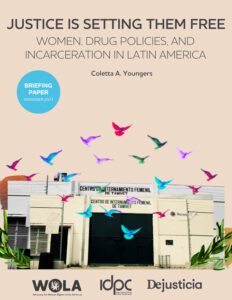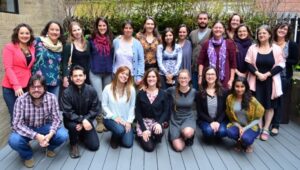“Justice condemns women with a double penalty for being a woman… especially as a low-income woman, you’re invisible in the system until you commit a crime. Then, they finally see you.” —Nora Laura Calandra, co-founder of La Rama de Libertadxs y Familiares.
The incarceration of women is growing at alarming rates worldwide and in Latin America it is driven by strict drug laws, with devastating consequences for the women impacted and their families. Their stories unveil contexts of poverty, lack of opportunity, and physical and sexual violence, and also reveal the discrimination of unjust legal systems and societies plagued by stigmatization and patriarchal attitudes. But they are also stories of resilience, as women coming out of prison in Latin America today are organizing and fighting for their human rights and the right to live with dignity.
In response to the growing crisis of women’s incarceration in Latin America, in 2015 organizations, experts and activists created a Working Group on Women, Drug Policies, and Incarceration, led by the Washington Office on Latin America (WOLA), the International Drug Policy Consortium (IDPC), and the Colombian NGO, Centro de Estudios de Derechos, Justicia y Sociedad – Dejusticia. Our objective is to significantly reduce the number of women deprived of liberty in Latin America, providing analysis and public policy recommendations and participating in advocacy initiatives at the international, regional, and national levels.
The purpose of this report is to reflect on almost ten years of collective research and joint advocacy by the working group, its achievements and disappointments, as well as challenges and opportunities for the future.

Download the report “Justice Is Setting Them Free: Women, Drug Policies, and Incarceration in Latin America” here.
The first effort was the publication and dissemination of “Women, Drug Policy and Incarceration: A Guide for Policy Reform in Latin America and the Caribbean,” which provides a roadmap for reducing the incarceration of women. The working group later published additional research and reports, proposing sound and clear policy recommendations that were valuable inputs for advocacy. In nearly ten years of collective action, the working group has succeeded in placing this issue on the agenda of relevant UN and OAS bodies and in countries across the region, creating a propitious environment for carrying out reforms.
Some countries have implemented promising reforms, such as the federal amnesty law in Mexico and a new law in Colombia that offers alternatives to incarceration for female heads of household. However, this success is tempered by the failure of governments across the region to do more to significantly reduce the number of women behind bars. The use of alternatives to incarceration remains woefully inadequate throughout the region, and governments have failed to put in place effective programs to support women leaving prison.
Along with advocacy efforts, the working group has sought to implement innovative communication strategies to transform the narrative about women behind bars and confront stigma and discrimination, showing the “human face” of women who end up in prison and the factors that contributed to their incarceration, and seeking to create spaces where women tell their stories in their own words. However, this provoked debate in the working group as to whether these efforts were reinforcing gender stereotypes, such as that of mothers in situations of poverty or that of women as victims of criminalization.

The Working Group on Women, Drug Policies, and Incarceration in Latin America is committed to working to prevent women from entering prison in the first place and to promoting the transformation of societies so that women have the opportunity to access the necessary skills and resources to live with dignity.
Looking ahead, the Working Group on Women, Drug Policies and Incarceration faces a number of challenges, including: the continued stigmatization of and discrimination against women in contact with the law, regional dynamics where both drug and prison policies have lost relevance, and the security-oriented discourse of many governments that allows a punitive culture to take root. Fortunately, these challenges go hand in hand with new opportunities, including in different spheres of the UN and the OAS. Some other areas for further work on this issue going forward include:
The Working Group on Women, Drug Policies, and Incarceration in Latin America is deeply committed to working to prevent women from entering prison in the first place and to promote the transformation of societies so that women have the opportunity to access the skills and resources necessary to live with dignity.